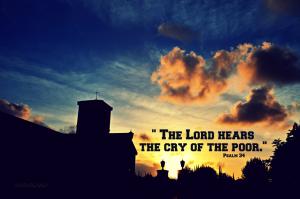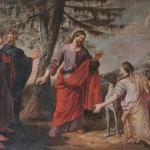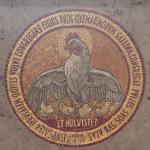
St. Peter Chrysologus pointed out that those who stand for and promote the poor are, according to Jesus, those who will be seen as of the highest rank in the kingdom of God. For God is a God of the poor. God stands with the poor, the needy, those who suffer injustice, and those, therefore, who support them imitate God:
That Abel suffered, that Noah preserved the world, that Abraham maintained faith, that Moses brought the Law, that Peter was crucified upside-down, about all of this God is silent and declares this alone: that the poor person ate. In heaven the subsistence of the hungry person ranks first; the offerings made to the poor person are the first consideration in heaven. Distribution to the poor is the first thing written in the divine registers. Blessed is the one whose name is read by God every time the poor person’s account is recited in heaven. [1]
Chrysologus was not suggesting we should not honor those who endured great suffering, those who protected and preserved some good in the world, or those who maintained their faith during great trials and tribulations. It is a given that such actions are praiseworthy. Indeed, it is because they are worthy of recognition and praise that we can better understand the value which is being placed upon those who work for and promote the needs of the poor. Society often thinks otherwise; it tries to suggest that the poor are unworthy of help. Society ridicules those who take care of those in need, suggesting that there is something wrong, not only with those in need, but those who help them, because they are said to be coddling the poor instead of truly helping them. On the other hand, God sees a reflection of divine love coming from those who put the poor and needy above all others, including themselves, which is why God grants them such high honors. Thus, in the eschatological judgment, those who did what they could on behalf of those in need will find their mercy given back to them, freeing the from various evils even as they helped free the needy from many evils in their lives:
On the day of evil God will be present to free the one who frees the poor person from evils. God will hear crying out in distress the one who has heard the poor person when he was crying out. The one who enabled the poor person to have good days will not see the day of evil. But the one who comes to judgment without a poor person as his advocate will see the day of evil. [2]
Jesus telling us that in the last judgment those who have helped the poor and needy will be shown to have helped him, and so will be rewarded, follows what Jewish tradition understood would happen in the eschatological judgment. For, in the Psalms, we read how one who is generous and charitable, especially to those in need, will find that the Lord will be on their side and protect them and keep them alive at the time of trouble: “Blessed is he who considers the poor! The LORD delivers him in the day of trouble; the LORD protects him and keeps him alive; he is called blessed in the land; thou dost not give him up to the will of his enemies” (Ps. 41:1b-2 RSV). The day of the Lord, the dark and dreaded day of the eschatological judgment, is when this will be fulfilled. For what greater trial and tribulation, what greater day of trouble, can there be than the “day” on which everyone comes to terms with all the details of their lives, seeing all the good they have done, but also all the harm which they have caused? The one who has stood by the poor will find that the Lord truly will stand in for them and use that good as the foundation for the mercy which they will receive:
We are taught by many examples from the divine Scriptures how great a merit there is in almsgiving and how great a power. Certainly all of us “benefit our own souls” every time our compassion lends aid to the need of another. Our generosity should be ready and “willing,” dearly beloved, if we believe that all give to themselves what they provide for the needy. Those who “feed” Christ in the poor store up their “treasure in heaven.” [3]
The greatest treasure is not some perishable wealth, but love; the more one engages love, the greater it will become, and with it, they will receive more and more of the bounty of love itself. Of course, giving to the needy can be done in a variety of ways; those who are needy themselves can give of themselves, their love and comfort, to others; they should not be made to think that if they have no money of their own, they will be cast off with those who have shown no mercy. It would be a terrible injustice if some found themselves lacking in the kingdom of God because they lacked material wealth in their temporal existence. On the other hand, no rich Christian should let the circumstances of the poor, and the different expectations put on them, serve as an excuse to justify avarice: “The well-off have a positive duty to be actively concerned for the poor, the strong for the weak, and it is the business of ministers of religion to use every possible means of moral suasion to ensure that those duties are fulfilled.” [4] Anyone who tries to find an excuse to ignore Christ’s dictates concerning alms show themselves committed to Mammon over Christ, and are guilty of the grave sin of idolatry. “And lest this perfection seem to be for just a few, he declares that avarice is slavery to idols. Not without reason. For whoever does not contribute to the needs of the poor and sets his own money, which he holds onto with a faithless grasp, above the commands of Christ commits the crime of idolatry by preferring the love of worldly goods to divine love.” [5]
Those who try to divert our attention to other, lesser sins, like sins of the flesh, and have us focus on them more than the greater sins, ignore what Christ, and Christian tradition, has said. What good is there for someone to not give into lust for the flesh, if, instead, they give into a greater lust, one which causes greater harm in the world? Those who give out of love will find love will cover a multitude of sins, while those who do not embrace such love will find, as Paul said, that all their other virtues lead to naught. This is why Jesus, and tradition, looks to the way love has been embraced as the criteria for the last judgment, and why Christians, ignoring this, reveal how much of their faith is a farce as they risk Jesus said he never knew them.
[1] St. Peter Chrysologus, Selected Sermons. Volume 2. Trans. Willam B Palardy (Washington, DC: CUA Press, 2004),68 [Sermon 14].
[2] St. Peter Chrysologus, Selected Sermons. Volume 2 ,68 [Sermon 14].
[3] St Leo the Great, Sermons. Trans. Jane Patricia Freeland CSJB and Agnes Josephine Conway SSJ (Washington, DC: CUA Press, 1996), 35 [Sermon 6].
[4] Vladimir Solovyey, God, Man & The Church. The Spiritual Foundations Of Life. Trans. Donald Attwater (Cambridge: James Clarke & Co., 2016), 41.
[5] John Cassian, The Conferences. Trans. Boniface Ramsey, OP (New York: Newman Press, 1997), 437 [Twelfth Conference; Chaeremon].
Stay in touch! Like A Little Bit of Nothing on Facebook.
If you liked what you read, please consider sharing it with your friends and family!
N.B.: While I read comments to moderate them, I rarely respond to them. If I don’t respond to your comment directly, don’t assume I am unthankful for it. I appreciate it. But I want readers to feel free to ask questions, and hopefully, dialogue with each other. I have shared what I wanted to say, though some responses will get a brief reply by me, or, if I find it interesting and something I can engage fully, as the foundation for another post. I have had many posts inspired or improved upon thanks to my readers.












